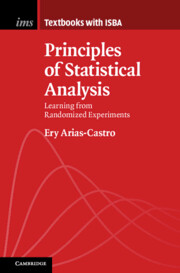Book contents
- Frontmatter
- Dedication
- Frontmatter
- Contents
- Preface
- Acknowledgements
- Part I Elements of Probability Theory
- Part II Practical Considerations
- Part III Elements of Statistical Inference
- 12 Models, Estimators, and Tests
- 13 Properties of Estimators and Tests
- 14 One Proportion
- 15 Multiple Proportions
- 16 One Numerical Sample
- 17 Multiple Numerical Samples
- 18 Multiple Paired Numerical Samples
- 19 Correlation Analysis
- 20 Multiple Testing
- 21 Regression Analysis
- 22 Foundational Issues
- References
- Index
15 - Multiple Proportions
from Part III - Elements of Statistical Inference
Published online by Cambridge University Press: 22 July 2022
- Frontmatter
- Dedication
- Frontmatter
- Contents
- Preface
- Acknowledgements
- Part I Elements of Probability Theory
- Part II Practical Considerations
- Part III Elements of Statistical Inference
- 12 Models, Estimators, and Tests
- 13 Properties of Estimators and Tests
- 14 One Proportion
- 15 Multiple Proportions
- 16 One Numerical Sample
- 17 Multiple Numerical Samples
- 18 Multiple Paired Numerical Samples
- 19 Correlation Analysis
- 20 Multiple Testing
- 21 Regression Analysis
- 22 Foundational Issues
- References
- Index
Summary
When a die (with 3 or more faces) is rolled, the result of each trial can take one of as many possible values. The same is true in the context of an urn experiment, when the balls in the urn are of multiple different colors. Such models are broadly applicable. Indeed, even `yes/no’ polls almost always include at least one other option like `not sure’ or `no opinion’. Another situation where discrete variables arise is when two or more coins are compared in terms of their chances of landing heads, or more generally, when two or more (otherwise identical) dice are compared in terms of their chances of landing on a particular face. In terms of urn experiments, the analog is a situation where balls are drawn from multiple urns. This sort of experiments can be used to model clinical trials where several treatments are compared and the outcome is dichotomous. When the coins are tossed together, or when the dice are rolled together, we might want to test for independence. We thus introduce some classical tests for comparing multiple discrete distributions and for testing for the independence of two or more discrete variables that are observed together.
Information
- Type
- Chapter
- Information
- Principles of Statistical AnalysisLearning from Randomized Experiments, pp. 203 - 229Publisher: Cambridge University PressPrint publication year: 2022
